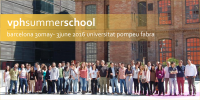From May 30th to June 3rd 2016, the first VPH Summer School took place at the Universitat Pompeu Fabra (UPF) (Barcelona, Spain) as an initiative of the recently established VPHi Student Committee.

This 5-days event was co-organized by the VPHi, UPF, and the Marie-Sklodowska Curie Initial Training Network European Industrial Doctorates Cardiofunxion. It was also supported by the Spanish Network of Excellence in Biomechanics Research, by Simula Research Laboratories, and by the European Society of Biomechanics.
During five days, the Summer School welcomed more than 50 participants, half of which followed more than nine hours of practical training under the supervision of both junior and senior researchers. The training sessions focussed on patient classification through machine learning, on the simulation of foetal circulation and cardiac activity through computationally efficient models, and on multiscale modelling of articular cartilage. Participants also presented research posters that were reviewed for a best poster award. The latter consisted in a 1000 Eur travel grant, provided by Simula Research Laboratories, and was won by Veronika Zimmer for the work “Multimodal Image Registration using Laplacian Commutators”.
The hands-on illustrated the diversity of the morning talks, the focus of which evolved from the clinical understanding of cardiac and musculoskeletal diseases, on day 1, to decision support for clinical therapy, on day 5. The ways to link these starting and ending topics of the Summer School were illustrated by talks on data acquisition for in silico modelling, on multiscale modelling, and on theoretical/computational implementation, from day 2 to day 4. Overall, the Summer School provided a general illustration of the simulation workflows that would be necessary to tackle complex health problems through in silico medicine strategies.
Last but not least, the Summer School was enriched by social events, such as the visits at the Barcelona Supercomputing Centre that hosts the MareNostrum, one of the most powerful European supercomputers, and at the Alba Synchrotron. The participants also enjoyed an evening of Catalan beer tasting, which naturally boosted the scientific discussions and the cross-dissemination of ideas ;-).
We hope that this summer school is just the starting point of a fruitful series of training for the education of current and future in silico medicine stakeholders.
More information can be found here